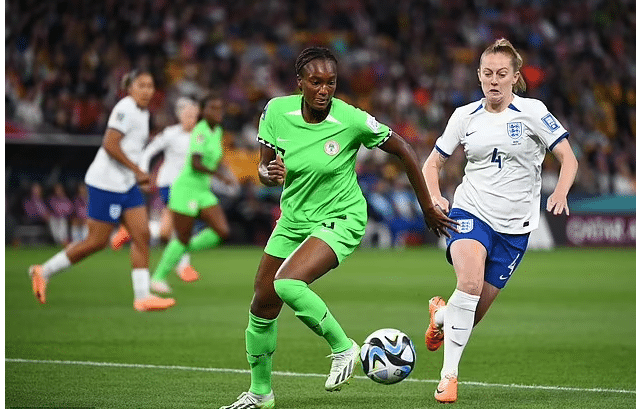
Nigerian striker Ifeoma Onumonu of the Super Falcons has drawn attention to the stark contrasts in resources and support between her team and their opponents, following their exit from the Women’s World Cup at the hands of England.
The recent last-16 clash between the Super Falcons and England concluded in a penalty shootout, with England prevailing 4-2.

A photo of Nigerian Super Falcons striker Ifeoma Onumonu alongside an opponent.While the match showcased the talent and determination of both teams on the field, it also underscored the glaring disparities in terms of resources and facilities for women’s football in Nigeria.
Speaking to The Guardian, Ifeoma Onumonu, who played a pivotal role in the game, expressed her observations and concerns about the inadequate resources available to the Nigerian team.
She compared the support systems enjoyed by the England team to the challenges faced by the Super Falcons, highlighting the discrepancies in training fields, accommodation, and recovery facilities.
“I’ve seen what England has access to. In Nigeria, we don’t have access to much.
“Our training fields aren’t great. Where we sleep isn’t great. Sometimes we share beds.
‘It’s not good enough. In terms of recovery, we don’t have much of any of that. We don’t have access to a gym in a camp in Nigeria. There’s a lot that needs to be done,” Onumonu revealed.‘
Onumonu, who plays for Gotham FC, also shed light on the difficulties the team faced while adjusting to the conditions of the tournament in Australia and New Zealand.
Despite the challenges, she emphasized the team’s determination to perform for their nation. She acknowledged the state of the playing pitches back home in Nigeria, which are marred by rocky terrain and uneven grass, and even described the conditions of the qualifying stadium as surprising.
In her words;
“We do what we can because we love playing for our country but hopefully they make it easier for us to do our best Back home the pitches aren’t great. The grass is rocky, bumps everywhere. The stadium we play in for qualifying, you’d be surprised”
The disparity in resources and support isn’t limited to the senior team alone. Onumonu brought attention to the struggles faced by the under-20s side as well.
She revealed that after their exit from the U20 World Cup in the quarter-finals last year, some members of the team were left sleeping in airports for over 24 hours.
“That’s not acceptable. What we have to fight for is bigger than us,” she said.
The Nigerian Football Federation (NFF) has come under fire for various issues, including delayed payments to players, inadequate facilities, cancellations of pre-tournament camps, and interference in matters of selection and staffing. This has led to heightened frustration among the players.
Recently, the global players’ union FIFPRO issued a statement on behalf of the Nigeria Women’s National Team, confirming their involvement in addressing ongoing disputes.
“Following the Nigeria women’s national team’s elimination from the FIFA Women’s World Cup, FIFPRO can confirm it is assisting players in a disagreement with the Nigeria Football Federation concerning bonus payments, camp allowances, and expenses, some of which date back to 2021.
“During the World Cup, the players expressed the desire to remain focused on their performance without making public statements or facing other distractions. However, the Super Falcons believe that it is now time for the Nigeria Football Federation to honour their commitments and pay the outstanding amounts.
“The team is extremely frustrated that they have had to pursue the Nigeria Football Federation for these payments before and during the tournament and may have to continue doing so afterwards. It is regrettable that players needed to challenge their own federation at such an important time in their careers.
“FIFPRO will continue to work with the players to ensure their contractual rights are honoured and the outstanding payments are settled,” the statement reads.

Leave a Reply